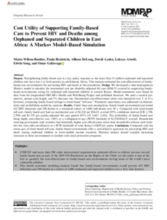Strengthening family-based care is a key policy response to the more than 15 million orphaned and separated children who have lost 1 or both parents in sub-Saharan Africa. This analysis estimated the cost-effectiveness of family-based care environments for preventing HIV and death in this population.
Highlights:
- UNICEF and more than 200 other international organizations endorsed efforts to redirect services toward family-based care as part of the 2019 UN Resolution on the Rights of the Child; yet this study is one of the first to quantify the cost-effectiveness of family-based care environments serving some of the world’s most vulnerable children.
- This health economic modeling analysis found that family-based environments would prevent 422 HIV infections and 298 deaths in a cohort of 1,000 orphaned and separated children over a 10-y time horizon.
- Compared with street-based “self-care,” family-based care resulted in an incremental cost of $2,528 per DALY averted (95% CI: 1,798, 2,599) and $2,355 per quality-adjusted life year gained (95% CI: 1,667, 2,413) after 10 y.
- Annual per-child expenditures for children living in family-based care environments in sub-Saharan Africa could potentially be increased by at least 25% and remain highly cost-effective.

